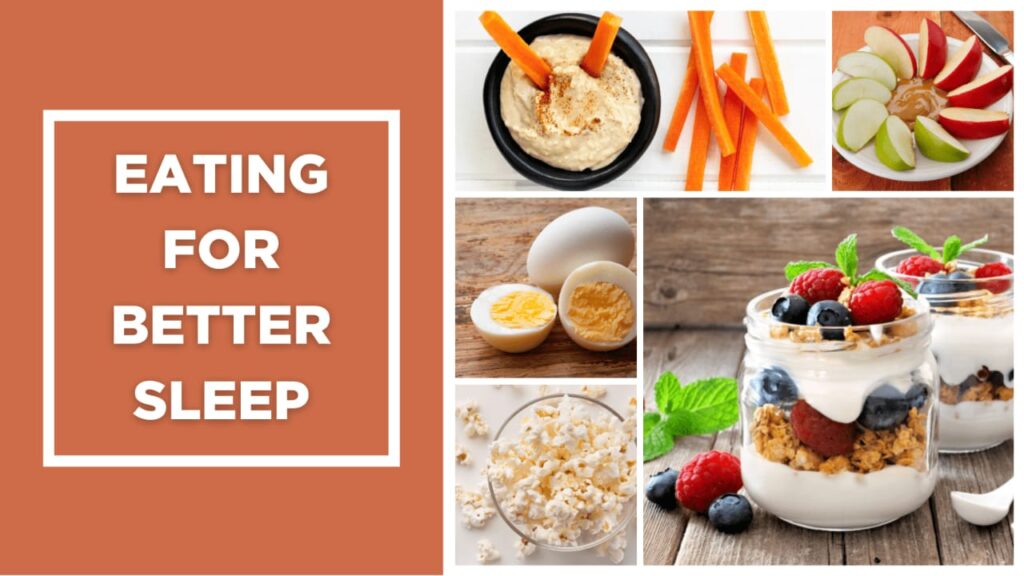Optimize Your Sleep with Nutrition: Learn how specific foods and nutrients like, magnesium, tryptophan, and vitamin B6, can naturally enhance sleep quality. This guide dives into sleep-promoting diets, eating habits, and practical tips to create a holistic approach to restful nights. The Science Behind Sleep and Nutrition

Sleep is governed by a complex interplay of hormones, brain chemicals, and environmental factors. Melatonin and serotonin, two crucial hormones, play vital roles in regulating your sleep-wake cycle. Both are influenced by your diet, as they are derived from nutrients such as tryptophan, magnesium, and vitamin B6. Moreover, a balanced diet can stabilize blood sugar levels and support a healthy metabolism, which indirectly contributes to restful sleep.
Poor dietary choices, on the other hand, can lead to disruptions in sleep patterns. Excessive caffeine, sugar, and processed foods can overstimulate the body, while deficiencies in essential nutrients may impair the production of sleep-regulating hormones.
Key Nutrients That Promote Restful Sleep
1. Tryptophan
Tryptophan is an amino acid that serves as a precursor to serotonin and melatonin. These hormones help regulate mood and sleep cycles. Consuming tryptophan-rich foods can increase your body’s production of these hormones, improving sleep quality.
Foods High in Tryptophan:
Turkey
- Chicken
- Eggs
- Nuts and seeds (e.g., almonds, pumpkin seeds)
- Dairy products (e.g., milk, cheese, yogurt)
2. Magnesium
Magnesium is often referred to as the “relaxation mineral” due to its ability to calm the nervous system. It helps regulate the release of melatonin and reduces stress, making it easier to fall asleep and stay asleep.
Foods High in Magnesium:
- Leafy greens (e.g., spinach, kale)
- Nuts and seeds (e.g., almonds, sunflower seeds)
- Whole grains (e.g., quinoa, brown rice)
- Legumes (e.g., lentils, chickpeas)
- Dark chocolate
3. Vitamin B6
Vitamin B6 is essential for converting tryptophan into serotonin. It also supports brain function and hormonal balance, both of which are critical for restful sleep.
Foods High in Vitamin B6:
- Bananas
- Avocados
- Potatoes
- Fish (e.g., salmon, tuna)
- Fortified cereals
- 4. Melatonin
- Melatonin is a hormone naturally produced in the body, but it can also be found in certain foods. Consuming melatonin-rich foods can help enhance your body’s natural production of this sleep-regulating hormone.
- Foods Containing Melatonin:
- Tart cherries
- Grapes
- Tomatoes
- Oats
- Walnuts
- 5. Calcium
- Calcium works in tandem with magnesium to promote relaxation and support the production of melatonin. It also helps regulate muscle function, which can prevent nighttime cramps and discomfort.
- Foods High in Calcium:
- Dairy products (e.g., milk, cheese, yogurt)
- Fortified plant-based milk (e.g., almond milk, soy milk)
- Sardines
- Broccoli
- Almonds
- Eating Habits for Better Sleep
- In addition to incorporating sleep-promoting nutrients into your diet, your eating habits can significantly impact sleep quality. Here are some tips to optimize your eating patterns for better sleep:
- 1. Avoid Heavy Meals Before Bedtime
- Large, heavy meals late in the evening can disrupt your sleep by causing indigestion. Aim to finish your last meal at least 2-3 hours before bedtime.
- 2. Limit Caffeine and Alcohol
- Caffeine stimulates the central nervous system and can interfere with your ability to fall asleep. Avoid consuming caffeinated beverages like coffee, tea, and energy drinks in the afternoon and evening. Similarly, while alcohol may make you feel drowsy initially, it can disrupt deep sleep cycles.
- 3. Snack Smartly
- If you feel hungry before bed, opt for light, nutrient-rich snacks that promote relaxation. Examples include a small bowl of yogurt with honey, a banana, or a handful of nuts.
- 4. Stay Hydrated
- Dehydration can cause discomfort and disrupt sleep. Drink plenty of water throughout the day, but reduce fluid intake in the evening to minimize nighttime trips to the bathroom.Foods to Avoid for Better Sleep
- Some foods and drinks can hinder sleep quality, especially when consumed close to bedtime. Avoid the following to ensure restful nights:
- Spicy foods: These can cause heartburn and discomfort.
- Sugary snacks: High sugar intake can lead to energy spikes and crashes.
- High-fat meals: Fatty foods take longer to digest and may cause discomfort.
- Processed foods: These are often high in artificial additives and preservatives that can interfere with sleep.
- Creating a Sleep-Friendly Routine
- While diet plays a significant role in promoting restful sleep, combining good nutrition with healthy lifestyle practices can further enhance your sleep quality. Consider implementing the following habits:
- Establish a consistent sleep schedule.
- Create a relaxing bedtime routine, such as reading or meditating.
- Limit screen time at least an hour before bed.
- Ensure your sleep environment is comfortable, quiet, and dark.
- Quetion
- Q1: What foods can help me sleep better?
- Ans) Foods such as turkey, bananas, nuts, and tart cherries are rich in nutrients like tryptophan, magnesium, melatonin, and vitamin B6. These nutrients promote hormone production and relaxation, leading to better sleep quality.
- Q2: Can supplements improve sleep quality?
- Ans) Yes, supplements like magnesium, melatonin, and vitamin B6 can aid sleep. However, it is essential to consult a healthcare professional before taking them to ensure safe and appropriate usage.
- Q3: How does sugar impact my sleep?
- Ans) Consuming excessive sugar can cause energy spikes and crashes, disrupting sleep. It may also interfere with the body’s natural regulation of sleep-wake cycles over time.
- Q4: Is drinking warm milk effective for sleep?
- Ans) Warm milk contains tryptophan, which supports relaxation and better sleep. Additionally, the calming act of drinking it before bed can help establish a bedtime routine.
- Q5: How can I manage late-night cravings?
- Ans) Eating balanced meals throughout the day can prevent late-night cravings. If needed, opt for light, sleep-friendly snacks like yogurt, a banana, or a handful of almonds.